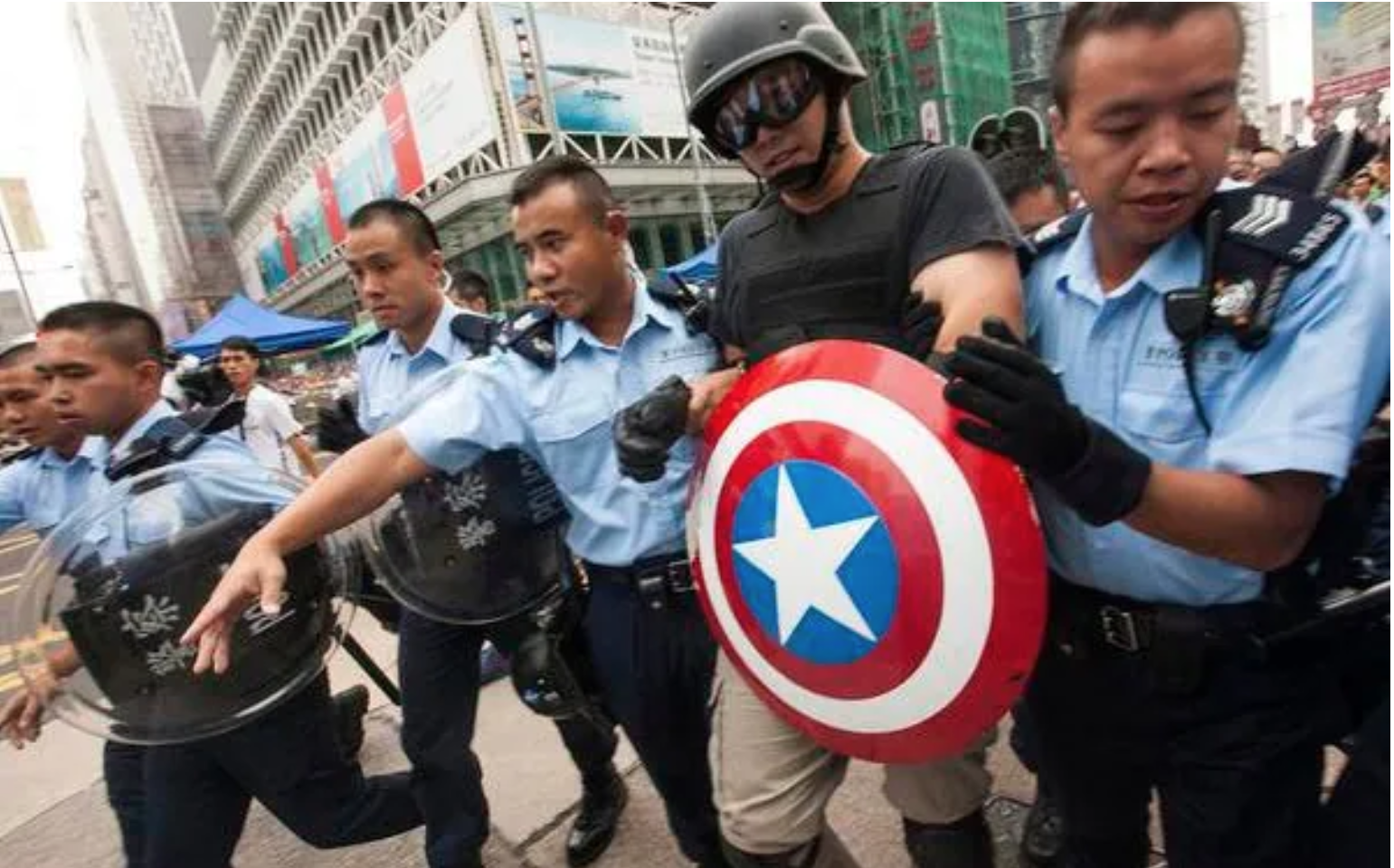
A Hong Kong district court on Oct. 25 found delivery worker-turned-activist Ma Chun-man guilty of incitement to secession for his actions at over 20 protests and in several interviews last year. Famously dubbed “Captain America 2.0” by local news media for dressing like the comic-book character at demonstrations, Ma is the second person to be convicted under China’s Law on Protection of National Security of Hong Kong. He was charged under articles 20 and 21 for advocating “separating Hong Kong from China, unlawfully changing its legal status or surrendering it to foreign rule.”
The prosecution submitted 20 video clips featuring Ma at protests between August and November 2020. Prosecution also submitted several of Ma’s personal effects, including placards and shirts with statements such as “The people of Hong Kong want an independent nation!” and a notebook labeled “Captain America’s Resistance Diary.” They also produced screenshots of similar messages posted by Ma on social media.
In his defense, Ma claimed he was merely exercising his civil right of free expression and assembly, guaranteed under Hong Kong’s Basic Law, without violent conduct, criminal intent, or even a realistic plan. Ma stated that no one responded to his “empty” slogans. However, District Judge Chan Kwong Chi noted the prosecution was not required to prove whether anyone committed any act as a result. The consistent “attitude, tenor and content” of the defendant, the judge said, showed his motive to undermine the security law.
The security law, promulgated by China in June 2020, has received international condemnation for violating Hong Kong’s autonomy. Over 100 pro-democracy politicians, journalists, and activists have now been arrested under its provisions.
The judgment also referred to the first conviction under the security law, in which protester Tong Ying-kit was sentenced to nine years in prison in July for riding a motorcycle into a line of police. Ma, facing up to 10 years in prison, will be sentenced in November.
From Jurist, Oct. 26. Used with permission.
See our last reports on the National Security Law and Tong Ying-kit.
Photo: Twitter via The Telegraph





Glimmer of judicial independence in Hong Kong
The Hong Kong Court of Final Appeal issued a unanimous judgment Nov. 4 holding that people cannot be convicted of rioting or illegal assembly if they are physically absent from the scene. The appeal centered on whether the city can prosecute rioting and illegal assembly crimes under the common law doctrine of joint enterprise. Examining sections 18 and 19 of Hong Kong’s Public Order Ordinance, the court found “taking part” to be a necessary element of the crimes. (Jurist)
HK: third conviction under national security law
A student activist who pushed for Hong Kong independence has been sentenced to three years and seven months after pleading guilty to “secession,” an offense under the Beijing-imposed national security law, and to money laundering.
Tony Chung, the youngest person to be convicted under the law at 20, said he pleaded guilty with “no shame in my heart” when he appeared in court about three weeks ago. The judge rebuked him for making a political declaration in court. (HKFP)
Chung was last year sentenced to four months for “insulting the Chinese flag” during a protest in May 2019.
HK: 11 guilty of rioting during 2019 National Day protest
Eleven people have been found guilty of rioting in Hong Kong’s Wong Tai Sin district during the anti-extradition bill protests in 2019. Twelve defendants, who were aged between 16 and 24 at the time of the protests, were accused of participating in a riot on Lung Cheung Road on the city’s National Day public holiday, Oct. 1, 2019. Eleven were found guilty by District Court Judge Edmond Lee, while one was acquitted. The defendants pleaded not guilty last August. Sentencing will take place on March 4. (HKFP, RFA)
UK judges resign from Hong Kong top court
The UK government on March 30 announced that two of its Supreme Court judges will no longer sit on Hong Kong’s top court, citing the China-imposed national security law that cracks down on dissent. (Jurist)
Chinese agents harass dissidents in the US
When activist and politician Sunny Cheung fled Hong Kong to the US two years ago, he thought he would be free. But his troubles followed him to Washington DC, where he established the Hong Kong Democracy Council. He says he’s received repeated threats on social media through what appear to be “fake accounts.” (PRX)